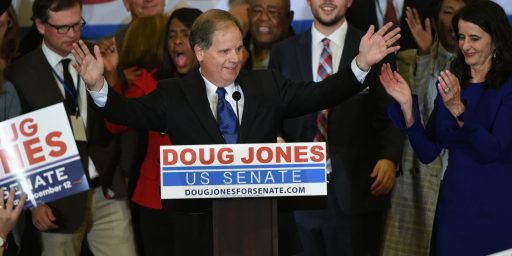Republicans Say They Have a Final Tax Bill, But Senate Democrats Want A Delay
House and Senate Republicans say they have reached agreement on a final tax bill, and Democrats are engaging in an effort to delay a vote in the Senate until Doug Jones can be seated.
Republicans on Capitol Hill have reportedly reached a deal to resolve the differences between the House and Senate tax bills, but the Democrats are saying they intend to use the results of last night’s election in Alabama to call for a delay in the final vote:
House and Senate Republicans have reached an agreement, in principle, on a consensus tax bill on Wednesday, keeping the party on track for final votes next week with the aim of delivering a bill to President Trump’s desk by Christmas, according to people briefed on the deal.
Senator John Cornyn of Texas, the majority whip, told reporters that Republicans will be briefed on the deal today, and that he is confident it will be approved next week.
Details on the deal were not immediately available. On Tuesday, Republicans said they were close to agreement on a package that included a cut in the corporate tax rate to 21 percent, from a high of 35 percent today, and reducing the top income tax rate for individuals to 37 percent from 39.6 percent.
It is not clear if Republican senators will roundly endorse the deal, which would allow provisions that Senators Susan Collins of Maine and Marco Rubio of Florida had raised concerns about earlier this week. Ms. Collins has said she’s not in favor of a lower individual rate and Mr. Rubio has pushed for a more generous child tax credit.
The Senate bill narrowly passed 51-49, with Senator Bob Corker, a Tennessee Republican, voting against the legislation, and other lawmakers, such as Ms. Collins, only getting on board once certain changes were made, such as expanding the medical expense deduction.
The agreement was finalized on Wednesday morning, hours before the first and only scheduled public meeting of the congressional conference committee formed to work out the differences between the House- and Senate-passed versions of the bill.
(…)
The House and Senate versions of the tax bill started from the same core principles — cutting taxes on business sharply, while reducing rates and eliminating some breaks for individuals — but diverged on several key details.
Those divergences included the size of an expanded child tax credit, which was larger, and able to be claimed by families much higher up the income scale, in the Senate bill; the treatment of pass-through owners, who received a large deduction in the Senate bill, but would have paid a reduced tax rate of no more than 25 percent in the House bill; and fundamental differences in the shape of a revamped system for taxing the profits of multinational corporations. The House also eliminated a host of individual tax breaks, including the ability to deduct student loan interest and medical expenses.
The Senate bill set individual tax cuts to expire, in order to comply with the rules of a budget procedure that allowed Republicans to bypass a Democratic filibuster as long as the legislation added no more than $1.5 trillion to the deficit over the next 10 years. The House bill’s cuts were permanent. The House bill would have eliminated the estate tax entirely after a period of several years. The Senate bill would have maintained the estate tax, though it would have applied to fewer taxpayers.
Even some areas where the bills matched up were fodder for controversy — and furious lobbying — in negotiations. Chief among them was the fate of the state and local tax deduction. Both bills eliminated deductions for state and local income and sales taxes paid, but allowed property tax deductions of up to $10,000 a year. Realtors and other groups pushed hard for that cap to be increased and for income taxes paid to also be allowed under it — a move that would have spared some higher-earning taxpayers in high-tax states such as California and New York from the tax increases they would have faced under the House and Senate bills.
A group of New York and New Jersey Republicans voted against the House bill over state and local deduction concerns. California Republicans largely backed the bill in the House, but they came under pressure during the conference negotiations to push for an expansion of the state and local deduction in order to avoid tax increases on many of their constituents.
Negotiators were also under pressure from business lobbyists to fix what appeared to be a drafting error in the Senate bill that could have effectively neutralized a popular tax break for business research and development. That error came in a last-minute move to reinstate a version of the corporate alternative minimum tax, which earlier bill versions had eliminated, and it forced Republicans to find other sources of revenue to compensate for their “fix” to the provision.
At the moment, the Conference Committee has yet to present a final form of the bill that would need to pass both the House and the Senate without alteration before it can be sent to the President for signature. As a result, the details of what has emerged from these negotiations is unclear, as is the question of whether or not the final bill will deal with issues such as the deductibility of state and local taxes and other issues that caused problems for both the House and Senate bills that were passed in the past month. As noted, even Republicans from states where constituents seem likely to lose out the most if limits are placed on the deductibility of state and local taxes have been hard-pressed to support the GOP bill and it’s unclear what if any changes have been made to the final bill to accommodate those changes. Also up in the air are questions such as the fate of the mortgage interest deduction and the Senate bill’s provision that would eliminate the insurance mandate contained in the Affordable Care Act while leaving virtually all other aspects of the PPACA in place, a move that most experts agree would lead to increased premiums for a wide swath of Americans and increases in premiums and deductibles that could make insurance unaffordable for millions more. Finally, the fate of the estate tax is up in the air, with Republicans under pressure to eliminate the tax entirely even though it would benefit only a relatively small handful of Americans, most of whom are are the higher end of the top income brackets. Until those details come out and analysts at the Congressional Budget Office and elsewhere have an opportunity to evaluate them, it’s premature to make any judgment at all about whether this is a good deal or a bad one.
In the meantime, in light of last night’s victory by Doug Jones over Roy Moore, Democrats are arguing that the Senate should wait to hold a final vote until Jones is seated:
WASHINGTON — Buoyed by their upset victory in Tuesday night’s Alabama Senate race, Senate Democrats on Wednesday demanded that Republicans delay the final vote on a massive tax overhaul until Doug Jones, the party’s new senator-elect, can be sworn in.
Senator Chuck Schumer of New York, the Democratic leader, called on his Republican counterpart, Senator Mitch McConnell of Kentucky, to “hit pause” on the tax vote. It is highly unlikely that Mr. McConnell will do so.
“It would be wrong for Senate Republicans to jam through this tax bill without giving the newly elected senator from Alabama the opportunity to cast his vote,” Mr. Schumer said.
Mr. Schumer cited precedent: the 2010 election of Scott Brown, a Massachusetts Republican, to the seat that had been held for decades by Senator Edward M. Kennedy. The Senate was weighing President Barack Obama’s health care bill at the time, and Democrats delayed the final vote — even though Mr. Brown’s election cost them their 60-vote filibuster-proof majority.
But aides to Mr. McConnell pushed back, saying that Democrats delayed the vote on health care only because they didn’t have enough votes to pass the bill.
Ultimately, Democrats solved their conundrum by skipping negotiations on a final health bill between the House and Senate and forcing the House to accept the Senate’s version of the Affordable Care Act, which had cleared the chamber before Mr. Brown’s election. A separate measure to clean up lingering issues with the health law was later adopted using a parliamentary procedure that ensured the legislation could pass the Senate with a simple majority.
Regardless of why Democrats waited for Mr. Brown before completing the health bill, it is not likely that Mr. McConnell would follow such pleasantries.
Democrats cited another precedent that proved that point: Mr. McConnell’s decision last year to block even a hearing for Mr. Obama’s Supreme Court nominee, Merrick Garland.
At the time, Mr. McConnell said the vote should be delayed until after the presidential election, saying the Senate should “let the American people decide” the future of the court.
“It seems to me that rather than continuing to force through this rough-hewed, one-sided tax bill, it would make more sense to take a step back and to reconsider a bipartisan path and to allow newly-elected, Senator-elect Jones to be a part of that debate,” said Senator Chris Coons, Democrat of Delaware.
Senate Minority Leader Chuck Schumer addressed the issue in a statement this morning:
Sen. Schumer calls for delay in tax vote until Doug Jones is sworn in: “It would be wrong for Senate Republicans to jam through this tax bill without giving the newly-elected senator from Alabama the opportunity to cast his vote.” https://t.co/QeyhXhcpAo pic.twitter.com/xJ8oVr85fN
— ABC News Politics (@ABCPolitics) December 13, 2017
Senator Elizabeth Warren, meanwhile, is “demanding” that Senate Republicans allow Jones to be seated immediately.44
I call on Senate Majority Leader Mitch McConnell to listen to the people of Alabama and seat @GDouglasJones without any delay.
— Elizabeth Warren (@elizabethforma) December 13, 2017
Neither of these demands are likely to be fulfilled, though.
Under the law, Jones will be entitled to be seated once his election has been certified by the appropriate election officials in Alabama. In order for that to happen, though, that authority will have to receive final certified results from all 67 counties in the state. As I understand it, there is no provision in either the law or Senate rules that would allow for this procedure to be bypassed or sped up. Ordinarily, of course, this isn’t a problem because Senators elected normally in a General Election don’t take office until the following January. These are not ordinary circumstances, though, thanks to the timing of the election itself, the fact that the Senate is so close to closing out business for the year, and the fact that the seat will change political parties when Jones does replace Luther Strange.
As CNN explains, state law gives the counties until December 22nd to complete the certification process, which includes certifying the accuracy of the reported results from last night, counting any eligible absentee or overseas ballots that were received in time to be counted but may not have been included in the initial totals reported last night, and resolving questions about provisional ballots that were not fully counted due to questions about either voter intent or questions about whether a voter was voting in the correct precinct or was properly registered to vote. As of this morning, the Secretary of State’s office in Montgomery was saying that they expect to be able to issue the necessary certification papers for Jones and have those documents sent to the Senate. At that point, of course, it is expected that the Senate will be out of session for the holidays and will not return until after the New Year. In other words, McConnell would be unable to arrange for Jones to be seated before the necessary paperwork is received even if he wanted to do it. As a result, Jones won’t be seated for at least three weeks and Alabama will continue to be represented by Senator Luther Strange absent the unlikely possibility that Strange resigns early and Alabama’s Governor appoints Jones to take his seat in the interim period between that resignation and when his election victory can be officially certified.
The only way for Senate Democrats to get what they want, therefore, would be for Senate Republicans to agree to delay a final vote until after the Senate returns from the holiday recess. Given the fact that Republicans are eager to get this bill passed before the end of the year, it’s highly unlikely that Senate Majority Leader Mitch McConnell will agree to such a delay, and there’s very little Democrats can do to force him to do so. No doubt, Democrats will seek to make this an issue in the coming week, but unless McConnell loses more than two Republican Senators over the details of the final tax bill there will be nothing they can do to prevent it from becoming law.







This CNN report has some details which Doug did not have when he wrote this, including:
a. fully repealing the corporate alternative minimum tax,
b. repealing the individual mandate from ACA,
c. cap the mortgage interest deduction at $750,000.
Not sure whether this will be graded as not exceeding the $1.5 trillion cap on adding to the deficit which was required to pass this under the Senate reconciliation rules to avoid needing 60 votes to shut down a filibuster. Which is of course a major reason why this bill will be rushed to passage.
This bill will just be another nail in the GOP coffin. McConnell with his let Alabama voters decide has suddenly shown that if voters do not agree with the GOP what the voters want means absolutely nothing.
Voters will remember this as what it is a betrayal of trust by the GOP. Seems McConnell and the GOP have forgotten that they are Public Servants not Demigods. Time for voters to remind the GOP that they are elected officials.
Hmm – I seem to recall McConnell refusing to take a matter promoted by Obama in 2016 to a vote until after the general election vote “to determine the will of the people”. Now he won’t delay a vote even after the will of the people is heard.
@Raymond Smith:
I think the impact of McConnell’s double standard will be lost on the GOP faithful because it’s being used to “benefit” them. It’s just GOP hardball because they currently have the whip in their hand. The GOP won’t care until the whip changes hands, and then they will blame the Democrat with the whip in his/her hand.
@Raymond Smith: Republicans do not have a philosophy of governing, or even, really, an ideology. They have a business plan. They do favors for rich donors and rich donors give them enough money to keep their cushy, and profitable, jobs. The donors have threatened to cut them off if they don’t pass this thing.
@pylon: Based on any polling this Trumpfare (welfare for the Trump family) bill is already counter to the will of the people. Waiting on Doug Jones to be seated doesn’t change that.
We should start a pool…how long before Republicans point to the damage this tax cut for wealthy does, as a reason for eliminating Medicare and SS?
I give it 6 months, tops.
What are the odds that this bill, written in haste and in secrecy, doens’tcontain flaws that will wreak havoc with individuals, business and the economy.
@MarkedMan:
Zero.
https://www.politico.com/story/2017/12/06/tax-plan-glitches-mistakes-republicans-208049
@Daryl’s other brother Darryl: Way less than that, Ryan floated it last week. Hatch already used it as an excuse for not renewing CHIP.
I am mainly interested how the tax plan will affect my investments in LexCorp.
When the Dems get the whip hand back, I hope the whip is a cat-‘o-nine-tails.
@SC_Birdflyte: You mean the Southern Democrats.